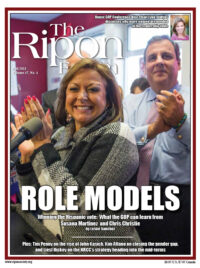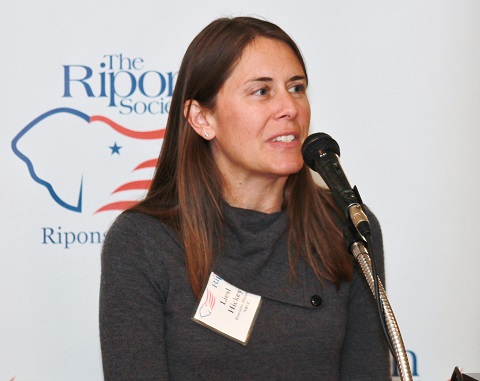“Democrats have every reason to be worried.”
Shortly after Liesl Hickey was named Executive Director of the National Republican Campaign Committee for the 2014 election cycle, Roll Call published a story about her that discussed her background in politics and the skills she was bringing to the position. The story quoted former colleagues and coworkers who offered their thoughts on the woman who had been hired to hold and build the House majority in the coming year.
“When she speaks, you better listen,” said one.
“She doesn’t get rattled easily,” said another.
In reading these and other observations, a common theme emerged – the new NRCC Executive Director is a no-nonsense individual who has been tested under fire and is more than up to the job. But one other thing emerged as well – Hickey is an individual who not only understands the importance of the Republican base, but understands that the base must be expanded if, in the long run, the GOP majority is to grow and endure.
She cut her teeth on Capitol Hill as the Chief of Staff to then-Representative Mark Kirk of Illinois. In this role, she was the architect of the Suburban Agenda, a positive, issue-oriented plan that was geared around the lives of once-reliably Republican suburban voters who had become turned off by the GOP’s message in recent years.
After spending the 2008 campaign managing the ONE Vote’s presidential advocacy initiative, she joined the National Republican Senatorial Committee to serve as an advisor during the elections of 2010. She was recruited by the NRCC to serve as Director of Incumbent Retention in 2012. When Oregon Rep. Greg Walden took over as NRCC Chairman last November, he made Hickey his first hire by elevating her to her current role.
“Liesl Hickey gets it,” Walden said in a statement announcing her appointment. “She understands how Republicans can win in competitive districts. She has sharp political instincts and led our Patriot Program to help the House retain the second largest GOP majority since the 1940s. With this solid base in place, she will lead our team forward to gaining ground in 2014.”
The Forum spoke with Hickey recently about her job as NRCC Executive Director, the mood of the electorate, and the Republican Party’s prospects in the mid-terms next year.
∗∗∗∗∗∗∗∗∗∗∗∗∗∗∗∗∗∗∗∗∗∗∗∗∗
RF: How do you view the political environment for Republicans heading into 2014?
LH: The political environment looks favorable for Republicans in 2014. Voters have a clear choice between a Democrat controlled Congress that prioritizes top-down control to protect Washington’s interests or a Republican controlled Congress that supports bottom-up solutions for hard working Americans. Voters have seen what happens when Democrats have sole control of Washington and they understand the need for a strong check on the Obama administration. Washington Democrats promised accountability and transparency in government that they have not delivered. From the IRS scandal, to soaring deficits and wasteful spending, and not to mention all the Obamacare shenanigans, voters are tired of the Democrats’ business-as-usual Washington approach to solving problems.
Our Republican Members are committed to staying on offense in 2014. Romney won 227 congressional Districts to Obama’s 208 in 2012. Thirty-one districts flipped back to voting Republican after voting for Obama in 2008. With 190 seats in deep Republican territory after redistricting, the House is well-aligned and in strong Republican hands. Democrats have every reason to be worried ahead of the elections next year. They are unable to campaign on Obamacare since it’s incredibly unpopular, especially in the Republican-leaning Districts where 15 Democratic Members currently reside. Their caucus is built on shaky ground. Just earlier this year, the DCCC was forced to release a list of 26 vulnerable Democratic incumbents, and it’s clear that with a year to go before the elections, the Democrats are having trouble defending the seats they already have – let alone gain the 17 seats they need to win.
RF: How is candidate recruitment coming?
LH: Thanks to our dedicated team of Members who serve on our recruitment committee, we have an excellent recruitment class this cycle. We also have one of the most diverse recruiting classes to date. Our candidates are community leaders, business leaders, local elected officials, veterans, mothers – all with a strong desire and commitment to making Washington work. They are impressive and respectable individuals who will serve as a stark contrast to their Democrat incumbents who have supported the failed policies of the Obama administration. We have more women candidates in competitive seats this cycle than in previous ones. We launched a women’s outreach and recruitment initiative this year called Project GROW to ensure our women recruits are equipped with the tools and training they need to win.
We have more women candidates in competitive seats this cycle than in previous ones.
RF: One of the storylines that came out of the 2012 election is that the GOP needed to broaden its base. What is the NRCC doing to reach out to women and minorities to win their support?
LH: This cycle, the NRCC has been working hard to expand our outreach across the country to a number of different groups and coalitions. We have spearheaded a woman’s-based initiative called Project GROW, which aims to mentor, recruit and increase involvement with women leaders and voters across the country.
Additionally, we’ve hired a National Coalitions Director who is working to create a clear roadmap to expand Republican engagement efforts in Hispanic, Asian and other demographic groups across the country. She is also helping to strengthen our coalition groups and boost grassroots support for all of our candidates, and has become a crucial part of our team.
Contrary to what the Democrats will say, the Republican party has the right message and path forward to problems facing women and minorities. We now are focused on effectively communicating those principles in a way that resonates with all Americans while reminding them why the Democrat agenda isn’t going to make their lives better.
RF: One other storyline in recent years is the political decline of the GOP in the Northeast. What is the NRCC doing to elect more Republicans and strengthen the party in that region of the country?
LH: The political climate in the Northeast may differ from other regions across the nation, but the frustrations with Obamacare and Democrats’ tax and spend agenda is toxic with these fiscally conservative voters. Republicans will compete in the Northeast and we have top candidates, including Elise Stefanik in NY-21, Richard Tisei in MA-06, and Lee Zeldin in NY-01, whose values and priorities will resonate with voters in each of their districts. Like voters across the country, voters in the Northeast are still waiting for the Obama promised solutions to their problems to appear and every day they become more disenfranchised with Democrat controlled Washington.
RF: Talk for a minute about the role of outside groups. How do they affect your planning, and do you expect them to be more of a positive or negative for Republicans next year?
LH: We are focused on our efforts here at the NRCC and are grateful for any groups that join us in the mission to ensure that Nancy Pelosi never becomes Speaker of the House again.
The political climate in the Northeast may differ from other regions across the nation, but the frustrations with Obamacare and Democrats’ tax and spend agenda is toxic with these fiscally conservative voters.
RF: With 2014 being a mid-term election, what does the party need to do to get its voters to the polls?
LH: The destructive policies of the Obama administration will be a motivating factor to large portions of the voting electorate next year. To capitalize on this frustration and use it to our advantage, this cycle we created a Strategy Department to make sure our campaigns are data driven so that we can create sophisticated ground games by modeling our targeted voters, persuading them to vote for our candidate and then turning them out to vote. We’ve created distinct voter profiles for our targeted districts and will also use this data to run more effective and targeted paid media campaigns.
RF: Speaking of polls, what steps has the party taken to make sure it has a clearer reading of the electorate than in 2012?
LH: After the 2012 elections, it was clear to many of us that our strategy and voter outreach needed to be reworked. Our newly-created strategy department, which works directly with our polling director, has taken a forensic look into what went wrong with polling in 2012 and have developed standards for polling in Congressional races.
We are also employing micro targeting more often and earlier this cycle to make sure we are effectively reaching our targeted audiences. We already know more about these seats and the voters than we did in 2012.
RF: If you had to pick an upset special right now, which race would it be?
LH: FL-13 (Bill Young’s seat) will be a very competitive special election next year. The primary is January 11, 2014 and the general election on March 14, 2014. RF





